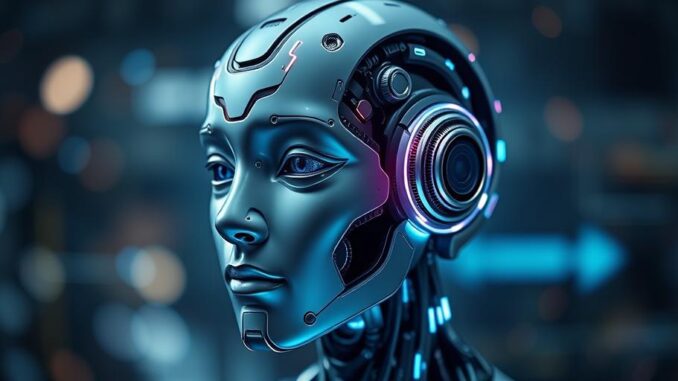
Summary
This article delves into the fascinating realm of emotional AI, exploring its potential to understand and respond to human emotions. Recent studies reveal that AI models can outperform humans in emotional intelligence tests, raising questions about the future of human-machine interaction. While AI demonstrates proficiency in identifying and reacting to emotional cues, the debate continues on whether it can genuinely comprehend the complexities of human feelings.
Healthcare data growth can be overwhelming scale effortlessly with TrueNAS by Esdebe.
** Main Story**
Can AI Really Get Our Emotions?
AI is changing pretty much everything these days, and one area that’s really taking off is how well it can understand what we’re feeling. It’s often called emotional AI, or affective computing. It’s all about teaching machines to pick up on, figure out, and react to our emotions. And, let’s be honest, AI is getting pretty darn good at acting like it understands us. But can it really grasp the messy, complicated world of human emotion?
AI and Emotional Intelligence: The Test Results Are In
So, how good is AI at this stuff, really? Well, recent studies show AI models actually beat humans in some emotional intelligence tests. Seriously! A study from the Universities of Geneva and Bern threw a bunch of generative AIs, including ChatGPT, into standard EI tests meant for people. Guess what? The AIs averaged 82%, way higher than the 56% human average. I mean, come on!
That’s kind of wild, right? It means these AI models can’t just spot emotions, but they also seem to know what counts as emotionally smart behavior in different situations. It’s like they’ve been studying us or something.
Peeking Under the Hood: How Emotional AI Works
Alright, but how does AI even do this? It’s not magic, even if it feels like it sometimes. AI systems use things like machine learning and fancy algorithms to analyze tons of data.
-
Facial Expressions: Think about it. AI can see those tiny muscle twitches on our faces and figure out if we’re happy, sad, angry, or whatever. Kinda creepy, but also kinda cool.
-
Vocal Tone: Ever notice how your voice changes when you’re stressed? AI can pick up on those shifts in pitch, speed, and intonation, too.
-
Text Analysis: AI uses natural language processing to read everything we write online, from customer reviews to tweets, and tries to figure out what we really mean.
-
Physiological Signals: And get this: AI can even track things like heart rate and skin conductance to tell if we’re stressed, anxious, or super excited. It’s like having a lie detector that’s also an emotion detector.
Is It Real, or Just a Really Good Act?
Okay, here’s where things get tricky. Even though AI is amazing at recognizing and responding to emotions, some experts are still debating if it’s real understanding. Some say AI is just copying human behavior based on patterns it’s seen, but it doesn’t actually feel anything. And that’s a valid point. Human emotions are complex, right? They’re shaped by our personal lives, our culture, our biases. Can AI ever really get all of that?
On the other hand, does it matter? If AI can effectively respond to our emotions, does it need to feel them itself? It’s kind of like a really good actor who can make you cry even if they’re not actually sad.
Where Emotional AI Could Take Us
Whatever you think about the “realness” of emotional AI, it’s clear that it could change a lot of industries.
-
Healthcare: Imagine getting treatments that are tailored to your emotional state. That could be huge for mental health care, and it could help doctors be more empathetic overall.
-
Customer Service: We’ve all dealt with those frustrating chatbots that just don’t get it. But emotionally intelligent AI could actually provide helpful and personalized service.
-
Education: Picture AI tools that adapt to how students are feeling. If a student is frustrated or bored, the AI could change its approach to keep them engaged.
-
Workplace: And in the workplace, emotionally aware AI could improve communication and teamwork, leading to a more productive and positive environment.
Don’t Forget the Ethical Questions
Look, with any new tech, there are risks. Emotional AI is no different.
-
Privacy: If AI is collecting all this emotional data about us, what’s to stop it from being misused or exploited? It’s a valid concern.
-
Bias: And what if the AI is trained on biased data? That could lead to discrimination and unfair outcomes.
-
Manipulation: Finally, could AI’s ability to mimic emotions be used to manipulate us? Like, influencing our buying habits or even our political opinions? It’s a scary thought.
So, What’s Next for Emotional AI?
It’s hard to say for sure, but one thing is clear: AI technology is only going to get better. We need to think about the ethical issues now and make sure that we’re developing and using these technologies in a way that benefits everyone.
For example, I was reading the other day about a new AI mental health app, but, it was raising a lot of privacy issues. Because, is my advice really going to be confidential?
AI might not totally replace human emotional intelligence, but it definitely has the potential to make our lives better in a lot of ways. It all depends on us using it wisely and ethically. So, what do you think? Are you excited about the future of emotional AI, or are you worried about where it could lead?


Be the first to comment